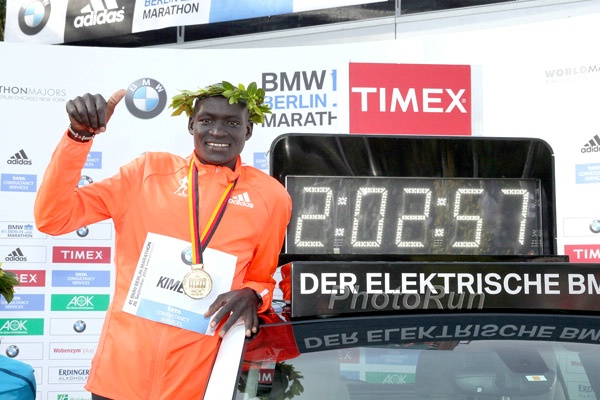2:02:57: A new marathon world record by the numbers


By now you’ve probably heard that in the early Eastern hours, during Sunday’s Berlin Marathon, Dennis Kimetto of Kenya smashed the marathon record running 42.2K in an astonishing time of 2:02:57.
This was the first time in history than anyone has run under the 2:03 mark and and was a full 26 seconds faster than the previous world record, held by Wilson Kipsang who ran 2:03:23 one year ago, also in Berlin.
Kimetto’s mark also eclipses the previous world’s best marathon time of 2:03:02 run by Geoffrey Mutai at the wind-aided 2011 Boston Marathon. That time was not eligible for a world record due to the point-to-point and net-downhill profile of the historic Boston course.
2:02:57!
Saying this is fast is an absolute understatement. To put it into perspective, we’ve crunched the numbers and present a few amazing facts about the feat.
Running 42.2K in 2:02:57 is an average pace of 2:55 minutes per kilometre or 4:41.5 per mile.
If you were to run that pace for one lap of a track, it would take only 69.9 seconds! How many 70 second laps can you do, let alone the 105.5 laps it would take to cover 42.2K?
That pace also equates to an average 5K time of 14:35 (although Kimetto ran his fastest 5K split — 30 to 35K — in 14:09).
Kimetto also ran a negative split, running the first half in 1:01:45 and then ran even faster — 1:01:12 — in the second half.
Kimetto’s record is the sixth time since 2002 that the marathon world record has been broken, all of them in Berlin.
Kimetto’s run was also a profitable one. In addition to the win — good for €50,000 — he also takes home €30,000 for breaking 2:04 and an additional €50,000 for setting the world record. That’s roughly $184,00, but that’s not all: Kimetto is now on top of the World Marathon Majors point standings for 2013-2014 which will net the winner an additional $500,000 USD. Only Wilson Kipsang can overtake Kimetto and to do so must win the New York Marathon in November. If that doesn’t happen, Kimetto will earn a total of some $742,000 from his run in Berlin, not to mention other sponsorship and endorsement deals.
Let’s not forget second-place finisher Emmanuel Mutai. Mutai ran neck-and-neck with Kimetto until 38K and finished in a time of 2:03:13, which was 10 seconds under Kipsang’s previous record.
Mutai has now finished second at a world marathon major seven times since 2009, twice having broken previous course records — last year in Chicago and Sunday in Berlin — while finishing second to Kimetto.
If it’s any consolation, Mutai set the 30K record while running the race and went through the mark in 1:27:37.
The new world record and the first sub-2:03 marathon in history will no doubt create renewed excitement about the potential for fast marathon running. It will reignite discussion as to if, and when, a sub-2:00 marathon will happen. Running 42.2K in 1:59:59 requires a pace of 2:50.5 minutes per kilometre.
What do you think? Is it simply a matter of time? Will someone break the two hour barrier? And if so, when?


